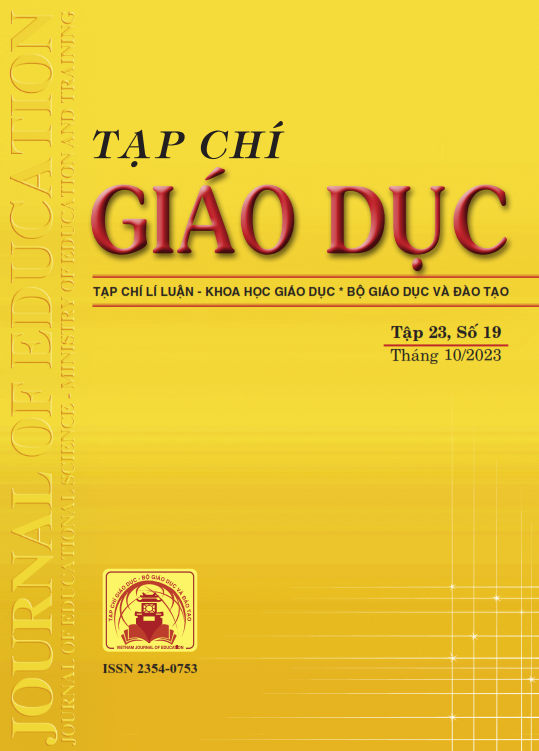Đánh giá của sinh viên về kết quả ứng dụng phương pháp học trải nghiệm tại Trường Du lịch - Đại học Huế
Tóm tắt
Experiential learning with innovative methods, such as project-based learning and community learning, is gradually being applied in many countries around the world to develop the capacity of university students. As one of the pioneering institutions in training high-quality tourism human resources in Central Vietnam, the School of Hospitality & Tourism - Hue University has applied experiential learning methods in various forms from the very first years of its establishment. The assessment results by 132 third-year and four-year students in Business Administration at the school presented the students' positive feedback. Most of them asserted that their learning outcomes when applying this method had significant progress in terms of (1) understanding of social issues, (2) a deep understanding of self, and (3) awareness and career skills. Accordingly, the study proposes several solutions to enhance the application of experiential learning methods as a reference model for higher education institutions, especially mainstream universities with the same or similar training area.
Tài liệu tham khảo
Burch, G. F., Giambatista, R., Batchelor, J. H., Burch, J. J., Hoover, J. D., & Heller, N. A. (2019). A meta‐analysis of the relationship between experiential learning and learning outcomes. Decision Sciences Journal of Innovative Education, 17(3), 239-273.
Čavlek, N. (2015). Experiential Learning in Tourism Education: The Case of ITHAS. In Tourism Education: Global Issues and Trends (Vol. 21, pp. 101-113): Emerald Group Publishing Limited.
Đào Thị Ngọc Minh, Nguyễn Thị Hằng (2018). Học tập trải nghiệm - Lí thuyết và vận dụng vào thiết kế, tổ chức, hoạt động trải nghiệm trong môn học ở trường phổ thông. Tạp chí Giáo dục, 433, 36-40.
Duong Huu Tong, Nguyen Phu Loc, Bui Phuong Uyen, Pham Hung Cuong (2020). Applying Experiential Learning to Teaching the Equation of a Circle: A Case Study. European Journal of Educational Research, 9(1), 239-255.
Hou, S. I. (2014). Integrating Problem-Based Learning with Community-Engaged Learning in Teaching Program Development and Implementation. Universal Journal of Educational Research, 2(1), 1-9.
Kolb, D. A. (1984). Experiential learning: Experience as the source of learning and development. NJ: Prentice Hall: Englewood Cliffs.
Lin, P. M., Kim, Y., Qiu, H., & Ren, L. (2017). Experiential learning in hospitality education through a service-learning project. Journal of Hospitality & Tourism Education, 29(2), 71-81. https://doi.org/10.1080/10963758.2017.1297716
Lyu, J., Li, M., & Wang, D. (2016). Experiential learning and its effectiveness from the perceptions of hospitality students. Journal of Teaching in Travel & Tourism, 16(4), 296-315. https://doi.org/10.1080/15313220.2016.1213149
Ma, J. (2017). Semiotising the student perception of learning outcomes in British higher education. Social Semiotics, 27(2), 227-242.
Mak, B., Lau, C., & Wong, A. (2017). Effects of experiential learning on students: An ecotourism service-learning course. Journal of Teaching in Travel & Tourism, 17(2), 85-100. https://doi.org/10.1080/15313220.2017.1285265
Pascarella, E. T., Seifert, T. A., & Blaich, C. (2010). How effective are the NSSE benchmarks in predicting important educational outcomes?. Change: The Magazine of Higher Learning, 42(1), 16-22.
Trường Du lịch - Đại học Huế (2020). Bản mô tả chương trình đào tạo ngành Quản trị kinh doanh. http://huht.hueuni.edu.vn/ban-mo-ta-chuong-trinh-dao-tao-nganh-quan-tri-kinh-doanh.html
Viện Nghiên cứu Phát triển Du lịch (2019). Kỉ yếu Hội thảo khoa học “Xu hướng phát triển của du lịch thế giới và tác động đối với du lịch Việt Nam”. Hà Nội.
Vo, T. N., Le, H. P. L., & Lam, T. T. V. (2021). Challenges for Student Satisfaction of Internship Program in Hospitality and Tourism Industry in Vietnam. Journal of Quality Assurance in Hospitality & Tourism, 23(5), 1298-1324. https//doi.org/10.1080/1528008x.2021.1964414
Yorio, P. L., & Ye, F. (2012). A meta-analysis on the effects of service-learning on the social, personal, and cognitive outcomes of learning. Academy of Management Learning & Education, 11(1), 9-27. https://doi.org/10.5465/amle.2010.0072
Tải xuống
Đã Xuất bản
Cách trích dẫn
Số
Chuyên mục
Giấy phép

Tác phẩm này được cấp phép theo Ghi nhận tác giả của Creative Commons Giấy phép quốc tế 4.0 .












